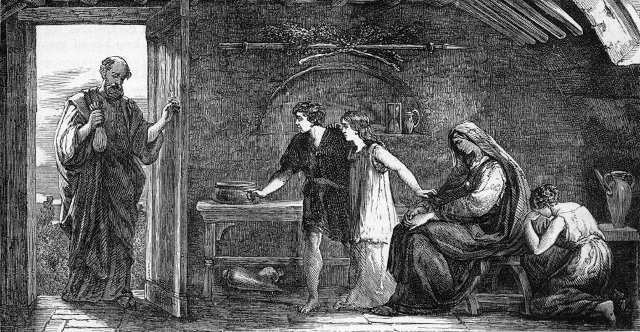
1
Î
n adevăr, orice mare preot, luat din mijlocul oamenilor, este pus pentru oameni în lucrurile privitoare la Dumnezeu, ca să aducă daruri şi jertfe pentru păcate.
For every high priest chosen from among men is appointed to act on behalf of men in things relating to God, to offer both gifts and sacrifices for sins.
2
E
l poate fi îngăduitor cu cei neştiutori şi rătăciţi, fiindcă şi el este cuprins de slăbiciune.
He is able to exercise gentleness and forbearance toward the ignorant and erring, since he himself also is liable to moral weakness and physical infirmity.
3
Ş
i, din pricina acestei slăbiciuni, trebuie să aducă jertfe atît pentru păcatele lui, cît şi pentru ale norodului.
And because of this he is obliged to offer sacrifice for his own sins, as well as for those of the people.
4
N
imeni nu-şi ia cinstea aceasta singur, ci o ia dacă este chemat de Dumnezeu, cum a fost Aaron.
Besides, one does not appropriate for himself the honor, but he is called by God and receives it of Him, just as Aaron did.
5
T
ot aşa şi Hristos, nu Şi -a luat singur slava de a fi Mare Preot, ci o are dela Cel ce I -a zis:,, Tu eşti Fiul Meu, astăzi Te-am născut.``
So too Christ (the Messiah) did not exalt Himself to be made a high priest, but was appointed and exalted by Him Who said to Him, You are My Son; today I have begotten You;
6
Ş
i, cum zice iarăş într'alt loc:,, Tu eşti preot în veac, după rînduiala lui Melhisedec.``
As He says also in another place, You are a Priest forever after the order (with the rank) of Melchizedek.
7
E
l este Acela care, în zilele vieţii Sale pămînteşti, aducînd rugăciuni şi cereri cu strigăte mari şi cu lacrămi către Cel ce putea să -L izbăvească dela moarte, şi fiind ascultat, din pricina evlaviei Lui,
In the days of His flesh offered up definite, special petitions '> but needed] and supplications with strong crying and tears to Him Who was able to save Him from death, and He was heard because of His reverence toward God '> in that He shrank from the horrors of separation from the bright presence of the Father].
8
m
ăcar că era Fiu, a învăţat să asculte prin lucrurile pe cari le -a suferit.
Although He was a Son, He learned obedience through what He suffered
9
Ş
i după ce a fost făcut desăvîrşit, S'a făcut pentru toţi cei ce -L ascultă, urzitorul unei mîntuiri vecinice,
And, making Him perfectly, He became the Author and Source of eternal salvation to all those who give heed and obey Him,
10
c
ăci a fost numit de Dumnezeu: Mare Preot,, după rînduiala lui Melhisedec.``
Being designated and recognized and saluted by God as High Priest after the order (with the rank) of Melchizedek.
11
A
supra celor de mai sus avem multe de zis, şi lucruri grele de tîlcuit; fiindcă v'aţi făcut greoi la pricepere.
Concerning this we have much to say which is hard to explain, since you have become dull in your hearing and sluggish '> slothful in achieving spiritual insight].
12
Î
n adevăr, voi cari de mult trebuia să fiţi învăţători, aveţi iarăş trebuinţă de cineva să vă înveţe cele dintîi adevăruri ale cuvintelor lui Dumnezeu, şi aţi ajuns să aveţi nevoie de lapte, nu de hrană tare.
For even though by this time you ought to be teaching others, you actually need someone to teach you over again the very first principles of God’s Word. You have come to need milk, not solid food.
13
Ş
i oricine nu se hrăneşte decît cu lapte, nu este obicinuit cu cuvîntul despre neprihănire, căci este un prunc.
For everyone who continues to feed on milk is obviously inexperienced and unskilled in the doctrine of righteousness (of conformity to the divine will in purpose, thought, and action), for he is a mere infant!
14
D
ar hrana tare este pentru oamenii mari, pentru aceia a căror judecată s'a deprins, prin întrebuinţare, să deosebească binele şi răul.
But solid food is for full-grown men, for those whose senses and mental faculties are trained by practice to discriminate and distinguish between what is morally good and noble and what is evil and contrary either to divine or human law.
 Romanian
Romanian
 Albanian - Shqip
Albanian - Shqip
 Arabic - العربية
Arabic - العربية
 Bulgarian - Български
Bulgarian - Български
 Chinese - 汉语
Chinese - 汉语
 English - English
English - English
 French - Français
French - Français
 German - Deutsch
German - Deutsch
 Italian - Italiano
Italian - Italiano
 Māori - Te Reo Māori
Māori - Te Reo Māori
 Portuguese - Português
Portuguese - Português
 Romanian - Română
Romanian - Română
 Russian - Русский
Russian - Русский
 Somali - Af Soomaali
Somali - Af Soomaali
 Spanish - Español
Spanish - Español
 Ukrainian - Українська
Ukrainian - Українська
 Vietnamese - Tiêng Viêt
Vietnamese - Tiêng Viêt
 English
English
 Albanian - Shqip
Albanian - Shqip
 Arabic - العربية
Arabic - العربية
 Bulgarian - Български
Bulgarian - Български
 Chinese - 汉语
Chinese - 汉语
 English - English
English - English
 French - Français
French - Français
 German - Deutsch
German - Deutsch
 Italian - Italiano
Italian - Italiano
 Māori - Te Reo Māori
Māori - Te Reo Māori
 Portuguese - Português
Portuguese - Português
 Romanian - Română
Romanian - Română
 Russian - Русский
Russian - Русский
 Somali - Af Soomaali
Somali - Af Soomaali
 Spanish - Español
Spanish - Español
 Ukrainian - Українська
Ukrainian - Українська
 Vietnamese - Tiêng Viêt
Vietnamese - Tiêng Viêt
